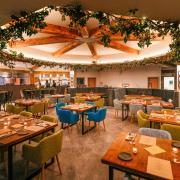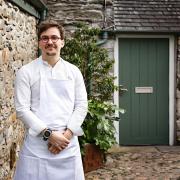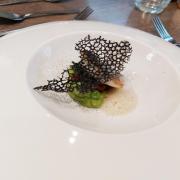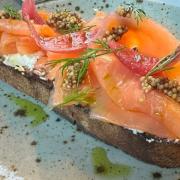Lancastrian Matthew Fort, fresh from opening Clitheroe Food Festival, talks to Charles Nevin about the blossoming of red rose cuisine Photography: John Cocks
Lancashire food has no stouter champion than Matthew Fort, doyen of British food writers, judge on the BBC’s Great British Menu, and Official Opener of the Clitheroe Food Festival.
This is a man who can speak of Eccles Cakes, Black Puddings and meat-and-potato pies with the same relishing reverence he brings to memories of filets de hareng, pommes a l’huile, choucroute alsacienne and blanquette de veau in Paris. Even the fate of our tripe is treated as you would the sad demise of a dear friend.
Reverie follows reminiscence on such digestive and digested delights as the cheese that used to lie gently maturing in the cellars of Hargreaves, the legendary and now departed Clitheroe Italian Warehousemen, or the mixed grill in Morecambe that was free if you could finish it ‘which nobody ever did, because it consisted of what appeared to be the Great Wall of China modelled from chips on top of which were strewn chops, kidneys, liver, fried egg, sausages, steak and other meaty wonders too profuse to list.’
The eyes grow wider; every word, every dish, is lovingly savoured as restaurants and chefs like Paul Heathcote and Nigel Howarth trip off the tongue, and the future for Lancs food is pronounced good. It is a rich, delightfully plummy performance: Matthew in top drawl has tone and timbre that even a fellow Old Etonian like Boris Johnson might find a bit posh. But then Boris hasn’t benefited from the extra input of a rather irregular spell as the only boy at Roedean, the famous girls’ school, where his mother was headmistress (he seems, for some reason, to have been incurably happy ever since).
Anyway, not all Lancastrians have to speak with hard vowels. I am a Lancastrian who doesn’t, as it happens, which often leads people to say to me, accusingly: ‘Well, you don’t sound like one.’ And Matthew does have impressive credentials: the Forts of Read Hall represented Clitheroe in the House of Commons regularly from the 18th century on: Matthew’s father was the last. Perhaps most importantly, like all true sons of the red rose, he doesn’t take himself entirely seriously.
Remarkably, too, this stout champion seems only a touch stouter than when I used to play rugby with him 25 years ago, when he was an admittedly well-covered but dashing centre. ‘I have a very forgiving metabolism,’ he says. ‘And a good tailor.’
Among his early memories are going round the constituency with his father and having his ‘poor little seven-year-old’s hand crushed by the meaty fist of a farmer out in Bowland and my poor little seven-year-old’s cheek vigorously pinched by a captain of industry in one of the towns below.’ He also has a claim to Lancastrianism that few can match: the Fort family still owns Preston Station. But, regrettably, only for a peppercorn rent ‘which makes you wonder about the financial acumen of my ancestors and realise why I have to struggle to make a living in an ungrateful world.’ Still, to own Preston Station: that is something, is it not?
He was among the first students at Lancaster University, and enjoyed it tremendously, not only for those mixed grills. There was also the old Lancaster Market, sadly no more, with farm-cured bacon and freshly peeled Bay shrimps to admire and dispose of admiringly. This is the key for Matthew to Lancashire food’s continuing revival and success: the prized quality of the ingredients, respected and treated with sophisticated skill by the likes of Howarth and Heathcote, subject of the first of his acclaimed food books, Rhubarb and Black Pudding.
A new series of the Great British menu will go out in the New Year. Meanwhile, Matthew will be writing away and promoting his new venture, a typically common and convivial delight: pork scratchings. Scratchings may be a Midlands concoction, says Matthew, but his bags of Mr Trotter’s Great British Pork Crackling are produced with a Lancastrian insistence on quality above all things.
‘Lancashire food is unique,’ he says. ‘I can’t think of anywhere else in England where industry and agriculture have been so closely intertwined. This is why you find things like black pudding and hot pies: basically these are cheap uses for meat produced en masse for working communities, but produced with respect, based on an appreciation of solid qualities, filling, nutritious and decent.’ This will ensure the future for Lancashire food and its producers, he says, together with the growing recognition from every Lancashire eater that good Lancashire food is there for the taking and, most importantly, enjoying.
‘One of Lancashire’s greatest traditions has been getting together and enjoying each other’s company and good food.’ And our habit of poking fun at our food, the pies and puddings and chips? Has that hindered the reputation of Lancashire cuisine? ‘Not at all, it’s helped. If I can adapt Oscar Wilde, good food is too important to be taken seriously.’


























